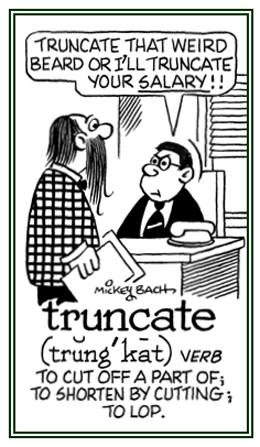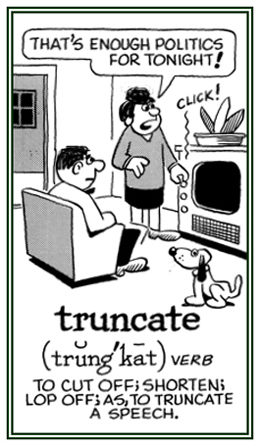-cate
(This suffix has no etymological source; it is just a part of other words.)
2. To make threefold by tripling something: Jill explained to the salesperson that she wanted to triplicate the items she was buying because she wanted to share them with her friends Leslie, Tina, and Mia.
3. Etymology: from Latin tripicare, "to triple".
triplicate (TRIP li kit) (s) (noun), triplicates (pl)
Something that has three precise parts to it or which exist in three exact reproductions: When Tim went to the photo shop to have his travel pictures developed, he wanted to have them printed in triplicate so he could place one set in his album and share two copies with his friends Erin and Patrick.
triplicate (TRIP li kuht) (adjective) (not comparable)
Descriptive of anything that has three explicit sections to it or which exist in three word-for-word presentations: Matt instructed his secretary to send triplicate invoices to the contractors who were working on the project.
2. To decrease a presentation by making it briefer; especially, by removing the end of it: Television coverage of the soccer match was truncated by a technical fault.
3. To restrict the precision of a decimal number by limiting or dropping the digits to the right of the decimal point without rounding them: The numbers 1.4262 and 1.4887 can both be truncated to 1.4 by not rounding them off.
4. Etymology: from Latin truncare, "to cut short, to mutilate".


Go to this Word A Day Revisited Index
so you can see more of Mickey Bach's cartoons.
If anyone wants to unbifurcate his or her garments, there are many styles from around the world as indicated in the following:
- Kilts, skirt-like garments, usually worn by men in the Scottish Highlands.
- Cassocks, long, robe-like clothing worn by members of the Catholic clergy.
- Fustanellas, short pleated skirts of white cloth worn by men in Greece and Albania.
- Hakamas, Japanese outer attire, worn by men and women, both of which have pleated, skirt-like appearances.
- Kimonos, loose, wide-sleeved robes, fastened at the waist with a wide sash, worn by men and women in Japan.
- Thobes, loose, long-sleeved, ankle-length wearing apparel for men, worn in Saudi Arabia, Kuwait, and other countries in that geographical area.
2. To be able to take care of a medical condition in an easy way: It was easy for the doctor to uncomplicate Jane’s sore throat because all she needed was a medicinal fluid to gargle with. vacate
Jerry and Doris will have to vacate their apartment when their lease expires.
2. To give up or to relinquish, to leave a position, an office, etc.: Because Jim was going to be on a sabbatical leave for a year, he vacated his position at the office.3. To render inoperative; to deprive of validity; to make legally void: Jack was proven to be innocent of the criminal charges and so his pending sentence was vacated.
2. To touch a part of the body lightly in order to excite the surface nerves and to cause uneasiness, laughter, or involuntary muscular jerks and contractions: Fred liked to vellicate his baby brother on the soles of his feet because it made tiny Tim giggle a lot!
3. Etymology: from Latin vellicatus, past participle of vellicare and vellere, "to pluck, to pull, to twitch", which is of uncertain origin.
2. To show that someone or something is justified or correct: Marilyn checked with a dictionary resource to vindicate the unusual spelling of a word in her essay.
3. To clear from censure, criticism, suspicion, or doubt, by means of demonstration; to justify or uphold by evidence or argument: The new evidence that was presented in the criminal trial immediately vindicated the defense lawyer's position that her client was innocent.
4. To assert, to maintain, to make good, by means of action; especially, in one's own interest; to defend against encroachment or interference: The doctor's prognosis of the severity of the patient's illness was vindicated by a specialist.
5. Etymology: back formation from vim dictam accusative form of vis dicta, literally "announced force"; that is, "announcement of force".
From "to avenge" or "to revenge", from Latin vindicatus, the past participle form of vindicare, "to set free, to lay claim to, to assert, to avenge" which came from vim, accusative of vis, "force" + the root of dicere, "to say".

Go to this Word A Day Revisited Index
so you can see more of Mickey Bach's cartoons.
2. Etymology: from Latin vivificare, "to make alive, to give life to, to restore to life".

